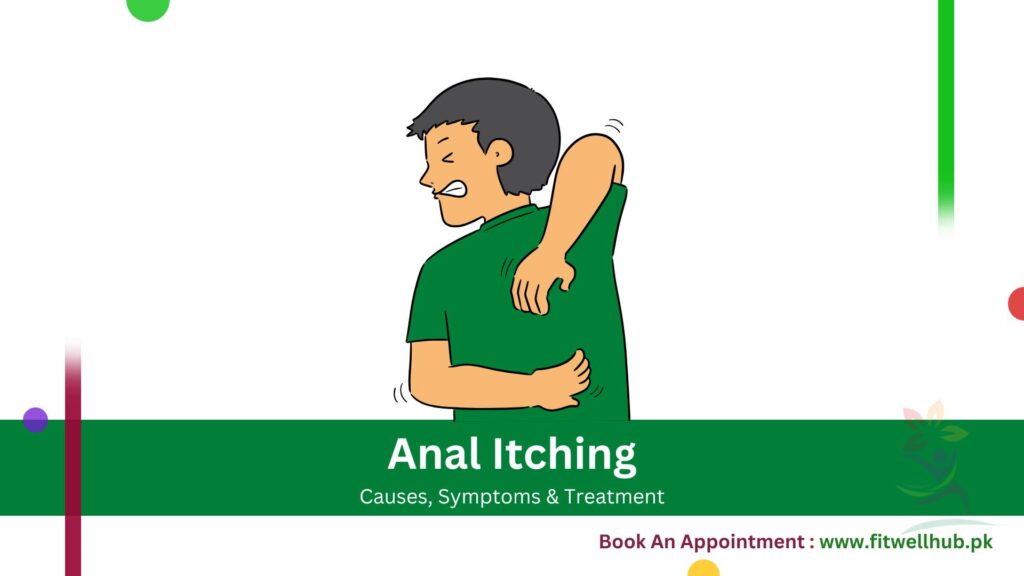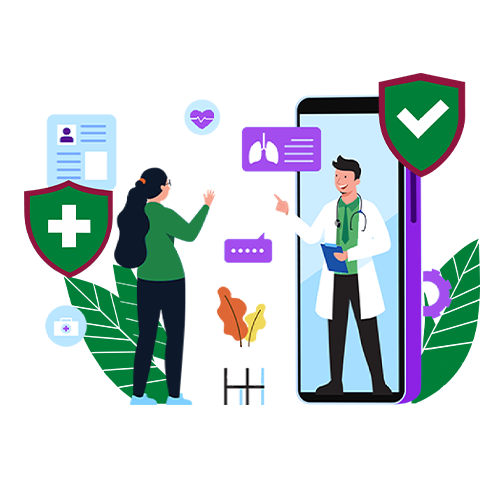Anal itching is a skin disease that is caused by persistent itching around the anus. Anal itching is also called pruritus ani. For the affected person, it causes embarrassing and distressing situations where scratching increases the irritation, making it worse.
Quick Links
ToggleIt can affect anyone, although it is more common in adults. Poor hygiene or dietary choices, infections, or skin disorders are its main causes. Having a complete understanding of the main cause is important in providing effective treatment and relief.
Symptoms
Anal itching appears with other symptoms that can affect daily life. Its main symptom is a continuous urge to scratch; other symptoms often appear with it:
- Redness: Redness around the anus causes irritation or inflammation. Allergic reactions, friction, or infections worsen with scratching, leading to further discomfort.
- Pain: Persistent itching, hemorrhoids, or anal fissures cause pain in the anal area. Pain increases during or after bowel movements, making it uncomfortable to sit or perform daily tasks.
- Swelling: The body’s response to irritation or infection causes swelling. This swelling makes the area tender and more sensitive, increasing the itching and discomfort.
- Dry Skin: Use of harsh soaps or over-cleaning causes dry and scaly skin around the anus. Due to the lack of moisture, the skin cracks and peels, which increases irritation and itching.
- Burning: Infection or irritation causes a burning sensation in the anal region. It causes uncomfortable feelings after bowel movements or continuous sitting and may lead to severe discomfort if left untreated.
- Rash: Allergic reactions, infections, or contact with irritating substances like certain fabrics or hygiene products cause rashes. Rashes are red, raised bumps or patches around the anus.
- Moist Feeling: Poor hygiene, excessive sweating, or infections can cause a moist or sticky sensation around the anus. It causes irritation and itching, creating a cycle of discomfort that needs to be addressed promptly.
GET IN TOUCH
Book An Appointment
When to See a Doctor
You can treat mild anal itching by following certain lifestyle modifications. If the itching continues for more than a few weeks, or if it is followed by infection, bleeding, or severe pain, you should consult with a doctor. At Fitwell Hub, our experienced doctors provide you with comprehensive care and effective treatment plans.
Ready to take the first step toward a healthier, happier you? Book an appointment with us today, and let our experts guide you on your wellness journey!
Causes
A few of the common causes of anal itching are discussed below:
- Poor Hygiene: Due to poor hygiene, moisture, sweat, and fecal matter accumulate around the anus. This accumulation causes skin irritation and itching. After bowel movements, poor cleaning is a common cause of this issue.
- Over-cleaning: For anal cleaning, the use of harsh soaps or wipes can wash away the skin’s natural oils. It increases skin dryness and sensitivity.
- Dietary Factor: The use of beverages, such as coffee, alcohol, and spicy foods, can irritate the anal area, especially during bowel movements. In vulnerable individuals, these dietary factors can stimulate or worsen anal itching.
- Hemorrhoids: Swollen veins in the rectum or anus cause hemorrhoids. These swollen veins can cause itching due to irritation and inflammation. During bowel movements, this condition can cause pain or discomfort.
- Infections: Infections like bacterial, fungal, or parasitic infections can irritate and itch around the anus. Pinworms commonly cause intense anal itching, especially in children.
Risk Factors
There are the following risk factors that increase the risk of developing:
Age: Older adults are more susceptible to developing skin diseases like itching, dryness, and thinning of the skin. As age increases, the skin around the anus becomes more vulnerable to irritation and sensitivity.
Obesity: Obesity creates additional skin folds, particularly around the anal area. In this folded area, moisture and irritants accumulate. It causes skin irritation and increases vulnerability to infections, contributing to continuous anal itching.
Complications
If anal itching is left untreated, it can cause the following complications.
- Skin Breakdown: Continuous scratching breaks down the skin around the anus. It leads to sores, cracks, and bleeding, making the area more vulnerable to infections and increasing discomfort.
- Infection: Chronic scratching increases skin vulnerability to bacterial infections. These infections can cause pain, swelling, and inflammation. It complicates the original condition and requires prolonged healing.
- Chronic Discomfort: Chronic discomfort is caused if anal itching is left untreated. Continuous irritation badly affects sleep, mood, and overall quality of life. It makes it difficult to focus on daily tasks and activities.
- Interference with Daily Activities: Severe or continuous anal itching interferes with daily activities such as sitting, walking, and even sleeping. The constant need to scratch creates distracting and embarrassing situations, affecting both personal and professional life.
- Worsening of Underlying Conditions: Eczema, hemorrhoids, or infections worsen if the itching is not properly managed. It leads to more severe symptoms and requires more intensive medical treatments, such as surgery or long-term medication.
Prevention
Anal itching can be prevented by maintaining good hygiene and changing lifestyle:
- Proper Hygiene: For the prevention of anal itching, the first step is maintaining hygiene. Properly clean and dry the area after bowel movements. It will remove irritants like sweat and fecal matter that are the main causes of discomfort and itching.
- Gentle Cleansing: Harsh soaps or wipes can remove skin’s natural oils and cause dryness and irritation. Therefore, avoid such kinds of soaps and wipes. Always use mild, fragrance-free products to clean the area.
- Breathable Clothing: Loose-fitting, breathable cotton underwear reduces moisture accumulation and allows the skin to breathe. This can prevent the buildup of sweat and reduce the risk of irritation in the anal area.
- Dietary Management: Avoiding dietary triggers, such as spicy foods, caffeine, and alcohol, can prevent irritation during bowel movements. It will reduce the risk of developing anal itching.
- Moisturization: To prevent dryness, keep the anal area moisturized. Dryness can further cause itching. Use a gentle, fragrance-free moisturizer. It helps to maintain the skin’s natural barrier, reducing the risk of irritation.
At Fitwell Hub, we offer a Healthy Elite Lifestyle Program particularly designed to help you prevent conditions like anal itching through comprehensive lifestyle and dietary guidance. Visit our help page to learn more about our program and services.
Diagnosis
For the diagnosis of anal itching, the following physical examinations and tests are used:
| Test/Procedure | Purpose | Details |
|---|---|---|
| Visual Inspection | Initial assessment of the anal area | Detects redness, swelling, or visible symptoms like external hemorrhoids. |
| Skin Swab | Identifies fungal or bacterial infections | Swab is analyzed in a lab for pathogens. |
| Stool Test | Detects parasitic infections, particularly in children | The swab is analyzed in a lab for pathogens. |
| Patch Testing | Identifies allergic reactions causing itching | Identifies pinworms or parasitic eggs in the stool. |
| Blood Tests | Detects underlying systemic diseases like liver disease or diabetes | Identifies medical conditions contributing to anal itching. |
At Fitwell Hub, our laboratory provides vast diagnostic tests to identify the main causes of anal itching. Visit our lab for more information.
Treatment
For the effective management and treatment of anal itching, the following treatment options are used:
- Lifestyle Changes: To manage and prevent anal itching, follow certain lifestyle changes, such as using a balanced diet, improving personal hygiene, and wearing breathable clothing. These changes reduce exposure to irritants and maintain skin health, providing long-term relief.
- Antifungal Treatments: To remove the fungal infection, antifungal ointments or creams are used. These creams clear up fungal-related symptoms and reduce itching.
- Topical Creams: Apply topical creams like hydrocortisone directly on the skin to reduce inflammation and itching. These creams soothe the skin by reducing the redness and discomfort.
Medications
The following medications are used to treat anal itching, depending on the underlying causes:
- Antibiotics: Antibiotics are used against bacterial infections. Antibiotics clean the infection by alleviating the symptoms like itching and inflammation.
- Antihistamines: Antihistamines are used to manage allergic reactions. These medications reduce itching caused by allergies and provide relief from irritation.
- Laxatives: Laxatives are used to alleviate constipation. It can increase anal itching. Laxatives help to ease bowel movements and reduce straining.
At Fitwell Hub, our pharmacy provides a wide range of medications for treating anal itching and related conditions. Visit our pharmacy to explore available options and consult with our experts.
GET IN TOUCH
Book An Appointment
Frequently Asked Questions (FAQ’s)
Poor hygiene, infections, dietary factors, over-cleaning, and hemorrhoids are the main causes of anal itching. Overuse of moisturizers or irritants worsens the condition.
If you are suffering from severe pain, bleeding, or infection like swelling, or if the itching continues for more than a few weeks, you should immediately consult with your doctor.
If infections cause anal itching, additional symptoms like redness, swelling, and a burning sensation will follow. If the itching is non-infectious, it may cause less severe discomfort.
Maintaining proper hygiene, using mild soaps, wearing breathable cotton underwear, avoiding dietary stimulants, and keeping the area moisturized can prevent anal itching.
Doctors use topical and antifungal creams, along with medications like antibiotics, antihistamines, and laxatives, to treat anal itching.














